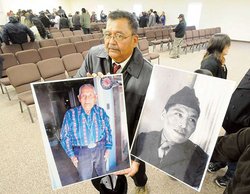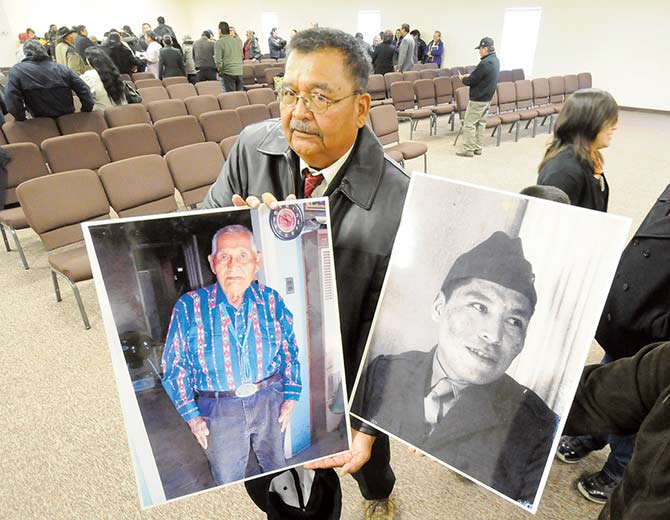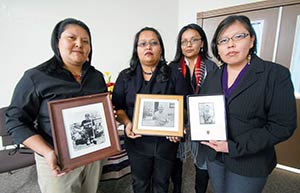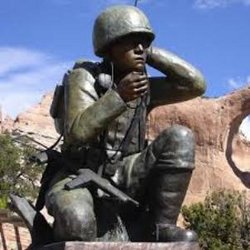"Johnny was a true warrior," said former Navajo Tribal Chairman Peter MacDonald Sr., who gave the eulogy at the memorial services for his "shaadaa'ni."
"If there was a threat to his people he rose to defend his people," he said.
He said Alfred was born in a sheep corral 1919 somewhere in the Cedar Ridge, Ariz., area. He was Todichii'nii (Bitter Water Clan), born for Tohani (Near the Water Clan). He is survived by his wife Lucille Alfred; his five children Lindbergh "Lindy" D. Alfred, Shirley A. Haswood, Natalie S. Alfred, Lawrence J. Alfred, and Larson J. Alfred; 20 grandchildren; 30 great-grandchildren and one great great-granddaughter.
"He was born here in the Western Navajo Agency, not in a hospital but in a sheep corral," MacDonald said. "We know that in those days there was no way to move around quickly. Transportation was by horse and wagon only. We had no modern conveniences. We had no Basha's, no McDonald's burgers, no cell phones, no Internet, no electricity, no running water. Some of us didn't even have windows.
"Life was hard but it was beautiful," he added.
Alfred attended Tuba City Boarding School where he learned to be responsible to carry out his duties as a student and learned the value of hard work. When he got older he served as a student advisor for a year before enlisting into the Marines and was trained at Camp Pendleton.
The Navajo code was developed then and he was among 439 individuals from the Navajo Nation that served as code talkers. Alfred was 22 years old when he enlisted in Oct. of 1942.
"He was a good man," said Lawrence Alfred, Johnny's son. "He was strict and was very disciplined. He loved his family and he never wanted any kind of recognition."
Johnny had worked 38 years in social services for the BIA until he retired. He was 91 years old.
"The man here with the United States flag draped over his casket lying silent and still, not only was he a veteran, but he was also a hero," MacDonald said. "He, along with many others, helped win the war to keep America free.
"He was a member of the second all-Navajo platoon," he said. "He was resourceful in facing up to the challenge of helping developing the code to make it coherent. It's the only unbreakable code in modern military history.
"Johnny was strong and tenacious," he continued. "He never asked for anything in return. He served without wanting anything in return. He was a humble man grounded in traditional values."
Family members agree.
"He never participated in marching in parades or anything like that," said Lawrence Alfred. "He loved life. He said, 'Why do you want to honor death? It stinks. War is hell. That's why the boogie man comes around at night.' That's what he used to call it when he was dealing with what he saw.
"He said, 'I love life and my family. I don't know why you want to honor death because it stinks.' That's what he told my son a not too long before he passed away," Lawrence continued.
"He was very humble. He never wanted to be honored. He told my son, 'When I'm dead and gone you can do what you want but right now I'm here
"'Why do you want to honor death? It stinks. You kill someone who has loved ones that love them. Somebody that has a family,'" Lawrence recalled his father words.
Lawrence recalled a story of his father's younger years when Johnny and his brother were throwing rocks at a blasting cap that miners left behind. It exploded with the blast knocking them back.
Some time after the explosion, they went looking for Johnny's mother's favorite donkey only to realize that there was blood dripping from holes in the donkey's ears, a result of the blast.
That proved to be a humorous tale compared to what MacDonald noted next.
"Johnny survived four of the bloodiest battles in the Pacific Theater," MacDonald said. "Tarawa, Saipan, Tinian and Okinawa. And like many veterans he never talked about his experiences.
"Our veterans were ferocious in battle and forgiven in victory," MacDonald said. "It was hell. Johnny went through that. Yes, he's a hero. He went through that so our people can live a better life. It's hard to accept that he's gone, that he's no longer with us. He lived a full life. He was 91 years old.
"Our hearts are heavy, our minds are wandering and our souls are numb," he added. "In the meantime, his words and prayers can be comforting to the family."
"Johnny, shaadaani," he said looking at the casket. "Thank you for your contributions. You brought honor to the Navajo Nation. You brought honor to the Navajo people. And you brought honor to the Navajo language."
By Jan-Mikael Patterson
Navajo Times
TUBA CITY, Feb. 5, 2011
"Johnny was a true warrior," said former Navajo Tribal Chairman Peter MacDonald Sr., who gave the eulogy at the memorial services for his "shaadaa'ni."
"If there was a threat to his people he rose to defend his people," he said.
He said Alfred was born in a sheep corral 1919 somewhere in the Cedar Ridge, Ariz., area. He was Todichii'nii (Bitter Water Clan), born for Tohani (Near the Water Clan). He is survived by his wife Lucille Alfred; his five children Lindbergh "Lindy" D. Alfred, Shirley A. Haswood, Natalie S. Alfred, Lawrence J. Alfred, and Larson J. Alfred; 20 grandchildren; 30 great-grandchildren and one great great-granddaughter.
"He was born here in the Western Navajo Agency, not in a hospital but in a sheep corral," MacDonald said. "We know that in those days there was no way to move around quickly. Transportation was by horse and wagon only. We had no modern conveniences. We had no Basha's, no McDonald's burgers, no cell phones, no Internet, no electricity, no running water. Some of us didn't even have windows.
"Life was hard but it was beautiful," he added.
Alfred attended Tuba City Boarding School where he learned to be responsible to carry out his duties as a student and learned the value of hard work. When he got older he served as a student advisor for a year before enlisting into the Marines and was trained at Camp Pendleton.
The Navajo code was developed then and he was among 439 individuals from the Navajo Nation that served as code talkers. Alfred was 22 years old when he enlisted in Oct. of 1942.
"He was a good man," said Lawrence Alfred, Johnny's son. "He was strict and was very disciplined. He loved his family and he never wanted any kind of recognition."
Johnny had worked 38 years in social services for the BIA until he retired. He was 91 years old.
"The man here with the United States flag draped over his casket lying silent and still, not only was he a veteran, but he was also a hero," MacDonald said. "He, along with many others, helped win the war to keep America free.
"He was a member of the second all-Navajo platoon," he said. "He was resourceful in facing up to the challenge of helping developing the code to make it coherent. It's the only unbreakable code in modern military history.
"Johnny was strong and tenacious," he continued. "He never asked for anything in return. He served without wanting anything in return. He was a humble man grounded in traditional values."
Family members agree.
"He never participated in marching in parades or anything like that," said Lawrence Alfred. "He loved life. He said, 'Why do you want to honor death? It stinks. War is hell. That's why the boogie man comes around at night.' That's what he used to call it when he was dealing with what he saw.
"He said, 'I love life and my family. I don't know why you want to honor death because it stinks.' That's what he told my son a not too long before he passed away," Lawrence continued.
"He was very humble. He never wanted to be honored. He told my son, 'When I'm dead and gone you can do what you want but right now I'm here
"'Why do you want to honor death? It stinks. You kill someone who has loved ones that love them. Somebody that has a family,'" Lawrence recalled his father words.
Lawrence recalled a story of his father's younger years when Johnny and his brother were throwing rocks at a blasting cap that miners left behind. It exploded with the blast knocking them back.
Some time after the explosion, they went looking for Johnny's mother's favorite donkey only to realize that there was blood dripping from holes in the donkey's ears, a result of the blast.
That proved to be a humorous tale compared to what MacDonald noted next.
"Johnny survived four of the bloodiest battles in the Pacific Theater," MacDonald said. "Tarawa, Saipan, Tinian and Okinawa. And like many veterans he never talked about his experiences.
"Our veterans were ferocious in battle and forgiven in victory," MacDonald said. "It was hell. Johnny went through that. Yes, he's a hero. He went through that so our people can live a better life. It's hard to accept that he's gone, that he's no longer with us. He lived a full life. He was 91 years old.
"Our hearts are heavy, our minds are wandering and our souls are numb," he added. "In the meantime, his words and prayers can be comforting to the family."
"Johnny, shaadaani," he said looking at the casket. "Thank you for your contributions. You brought honor to the Navajo Nation. You brought honor to the Navajo people. And you brought honor to the Navajo language."
By Jan-Mikael Patterson
Navajo Times
TUBA CITY, Feb. 5, 2011
Sponsored by Ancestry
Advertisement
Records on Ancestry
Sponsored by Ancestry
Advertisement





